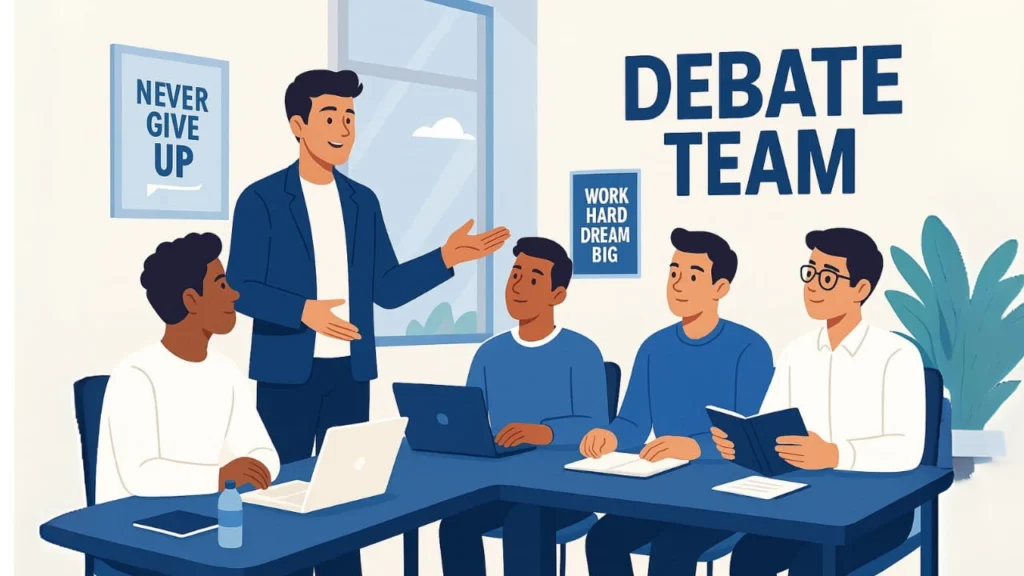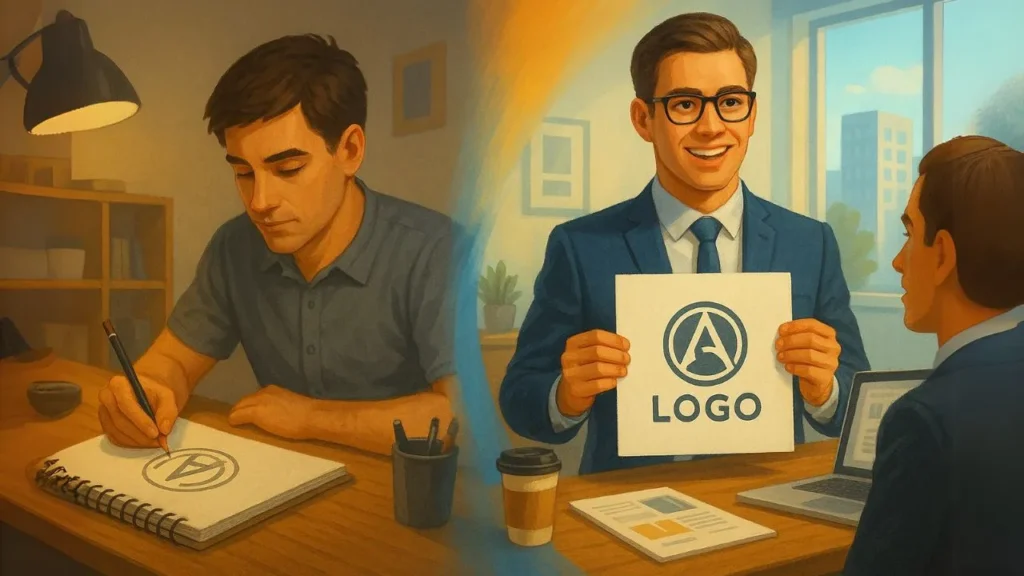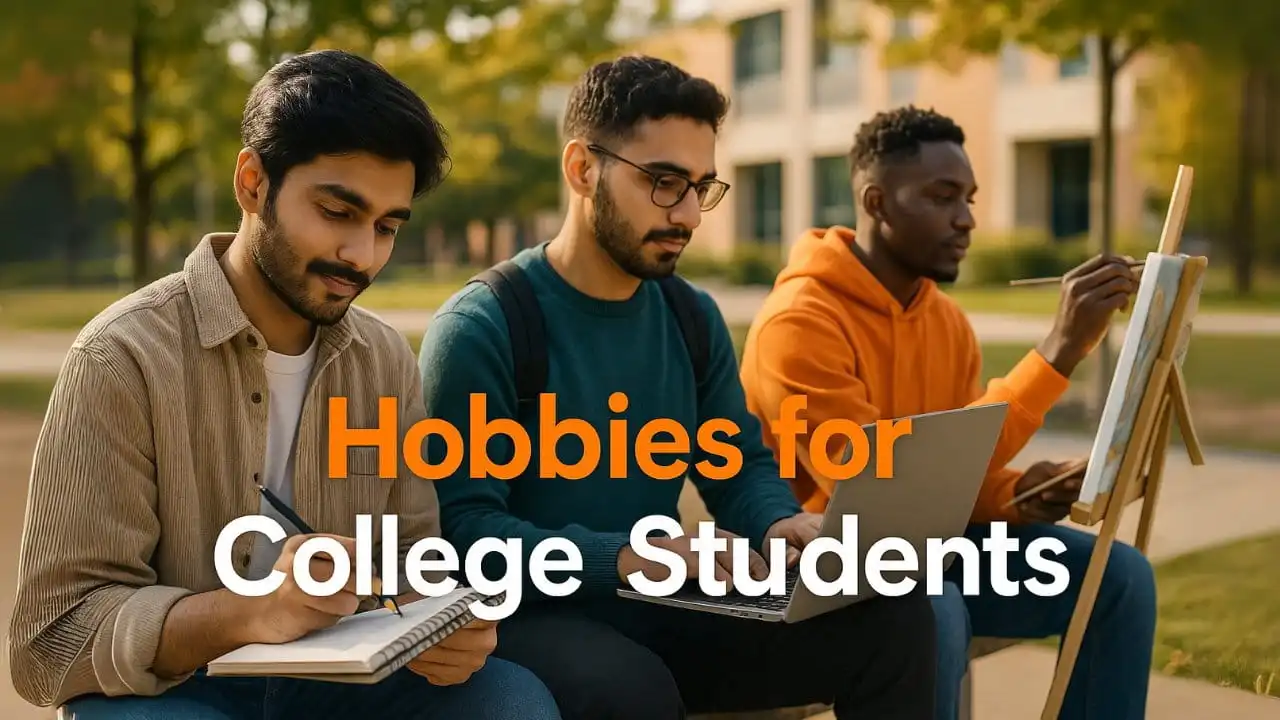So if you’ve ever Googled terms like “fun hobbies in college,” “productive hobbies for students,” or “how to pick a hobby as a college student,” you’re in the right place.
In this guide, you’ll explore 9 smart, enjoyable, and affordable hobbies, all designed to help you grow, relax, and maybe even find your next big opportunity.
Table of Contents
ToggleWhat Are Hobbies and Why They Matter in College Life?
Let’s be honest, college can feel like a never-ending loop of lectures, assignments, and expectations.
And somewhere between chasing grades and figuring out your future, it’s easy to forget yourself. That’s where hobbies step in, not as a distraction, but as a lifeline.
Hobbies for students are more than just a pastime. It’s a personal space you create, something that belongs to you, not your syllabus. Whether it’s sketching on your hostel bed, coding late at night, or simply watering a plant after class, these small actions have a deep psychological impact.
They support your mental well-being, help manage academic stress, and offer a natural outlet for emotions and burnout.
How Hobbies Improve Mental Health and Academic Performance?
Still think you don’t have time? Even the best hobbies for students often requires just 15 minutes daily, yet can completely transform your day and academic performance.
The key is finding something that feels rewarding, not like another task. This guide covers a handpicked list of hobbies for college students that are budget-friendly, personally enriching, and flexible enough for even the busiest schedules.
They’re your chance to create balance, sharpen your mind, and build a version of yourself that’s more than just a student.
Creative Hobbies to Express Yourself
1. Creative Writing

Writing isn’t about being a “writer.” It’s about being honest.
You don’t need flawless grammar, fancy notebooks, or perfect words. What you need is the courage to put your thoughts somewhere, and see what they reveal.
It’s you saying: “This moment, this feeling, it matters.” And on the tough days? Writing helps make sense of the mess.
It slows your racing thoughts. It captures what’s unspoken. And it becomes a mirror, one that shows you parts of yourself you didn’t even know were waiting to be seen.
You could start with:
- Journaling your day (and how you actually felt)
- Writing poems no one will read
- Creating short stories inspired by hostel life
- Or even anonymous blogging when things get too real
Why Writing Isn’t Just Emotional - It’s Transformational
Research shows that journaling reduces cortisol (your stress hormone), strengthens memory, and even boosts immune response. That’s not soft, that’s neuroscience backing what your heart already knew.
It helps you handle anxiety, break out of overthinking loops, and build emotional intelligence, something recruiters and life both value deeply.
You become a better communicator, in job interviews, group projects, and real-life relationships.
You don’t need a perfect plan. Use Google Keep, JotterPad, or just open a draft email to yourself.
The goal isn’t to be impressive, it’s to be honest. That’s how writing stops being a hobby and starts becoming a habit that heals, empowers, and elevates.
2. Painting and Sketching
That’s where painting and sketching step in: silent, colorful forms of expression that don’t need words to make sense.
Art as Therapy, Why Sketching Heals What Words Can’t
Have you ever lost track of time while shading a corner of a page? That’s not a coincidence, that’s your brain entering a flow state, a proven state of deep focus and mental calm.
Art therapy is no longer just for clinics, it’s becoming a self-care tool for students who want to reduce anxiety, feel more grounded, and handle stress better.
In India and across the world, colleges are now recognizing the mental health benefits of mindful activities like sketching, mandala drawing, and visual journaling.
Here’s what happens when you draw regularly:
- Your brain shifts away from negative thought loops
- Your breathing slows, and anxiety reduces
- You learn to focus, not on outcomes, but the process
You’re not just making art. You’re learning to slow down in a fast world.
The best part? You don’t need expensive supplies.
Start with a pen, a blank page, or a ₹50 sketchbook from your local market.
Apps like Procreate Pocket, Sketchbook, or even Instagram pages for daily prompts can help you build consistency.
. It won’t solve everything, but it might give your mind the break it’s been silently begging for.
3. Blogging and Vlogging
That’s the power of blogging and vlogging: turning your thoughts, opinions, or everyday life into something others can connect with, learn from, or be inspired by.
From Passion to Profit — Turning Your Blog or Vlog into a Side Hustle
A free platform like Blogger, WordPress, or YouTube Shorts is enough to start your journey. The key is consistency, authenticity, and speaking from the heart, something students naturally do best.
It wasn’t perfect, but it was real, and over time, it connected me with others feeling the same. That connection? It’s priceless.
Hobbies That Build Real-Life Skills
They sharpen how you think, speak, and show up in the world, often without you even realizing it.
Let’s begin with one of the most underrated life-changing skills: speaking with confidence .
1. Public Speaking & Debating

You’re not alone. In classrooms, internships, even casual meetups, the ability to express yourself clearly is often what sets confident students apart.
And no, it’s not just for toppers or future politicians. It’s for anyone who wants to be heard, understood, and respected.
The more you practice, the more you learn to organize thoughts, read the room, and respond with clarity under pressure.
That fear that used to hold you back in viva exams, interviews, or presentations starts shrinking with every speech.
Real Benefits of Public Speaking for Students
- Better articulation in English and your native language
- Stronger listening and critical thinking skills
- A serious confidence boost that shows in your body language
Public speaking for students isn’t just a career skill, it’s a confidence muscle. And the earlier you build it, the stronger it gets.
2. Language Learning
That’s what happens when you learn a new language during college. It’s not just impressive on a resume, it expands your mind, your opportunities, and sometimes, your worldview.
Language learning boosts memory, problem-solving skills, and even makes you better at your own language.
Apps like Duolingo, Memrise, and HelloTalk are making it easier than ever for college students to pick up Spanish, Korean, French, German, even Sanskrit or Tamil dialects.
Why Learning a New Language Gives You a Career Edge?
- Open up internships at international firms
- Increase your chances for study abroad programs
- Make you stand out in interviews (especially in roles like marketing, hos pitality, tech, and BPOs)
So whether it’s for career goals or cultural curiosity, language learning is one of the smartest and most future-proof hobbies you can pick up in college.
3. Web Design & Coding

With even basic coding skills, that idea doesn’t have to stay in your head.
Web design and coding aren’t just tech hobbies anymore, they’re creative, empowering, and surprisingly beginner-friendly.
Why Coding Is One of the Most Useful Hobbies for Students
Platforms like FreeCodeCamp, W3Schools, and Codeacademy offer free lessons tailored for beginners. Tools like WordPress or Framer make website building for students even easier, no advanced coding required.
It wasn’t top-notch, but it gave me a new kind of confidence, the kind that comes from creating something out of nothing.
Digital & Tech-Savvy Hobbies
1. Online Gaming (with Balance!)
For many students across India, Pakistan, and beyond, online gaming is more than a pastime, it’s a space for stress relief, strategy, and even income.
Why Student Gamers Are Building More Than Just High Scores
Here’s the key:
- Choose games that challenge your thinking
- Set clear playtime boundaries
- Avoid games that lead to sleep loss or stress
- Focus and strategic thinking
- Set clear playtime boundaries
- Online social skills and leadership
2. Graphic Designing
And college is the best time to learn.
You don’t need a design degree or fancy tools to get started, just curiosity and the right platforms.
Best Tools and Tips to Kickstart Your Graphic Design Journey (Now with AI Support)
Want to go deeper? Platforms like Adobe Express and Illustrator have integrated AI assistants that suggest layouts, color palettes, and icons based on your content goals.
- Visual thinking and creativity
- Digital branding and storytelling skills
- Real-world content for your portfolio or freelance gigs
3. Digital Note-Taking & Productivity Systems
Welcome to the world of digital note-taking and AI productivity systems, a hobby that’s as smart as it is satisfying.
How Digital Note-Taking Builds Focus and Long-Term Value
- Information retention
- Daily planning skills
- Clarity in both academic and personal tasks
And the best part? You don’t need design or tech skills, just curiosity and consistency.
If you’re into study planning, life organization, or just want to reduce mental clutter, this is the most underrated digital hobby of 2025.
Real-Life Examples: How Students Use Hobbies to Succeed

Common Hobby Myths (Busted)
Conclusion
FAQs
Start with 15-30 minutes daily. Productive hobbies like journaling or sketching require minimal time but provide significant mental health benefits. Consistency matters more than duration for building creative habits during college.
Coding, public speaking, graphic design, and blogging directly boost career prospects. These skill-building hobbies create portfolios, improve communication, and develop technical abilities that employers value in fresh graduates.
Yes. Creative hobbies lower cortisol levels and provide emotional outlets. Activities like painting, writing, and music help students manage academic pressure, improve focus, and maintain better mental health throughout college.
Photography, blogging, gaming, sketching, and language learning top the list. Many students combine traditional hobbies with digital platforms, creating content and building online communities while pursuing their interests.
Consider your interests, available time, and budget. Try different activities for a week each. Choose hobbies that either help you relax (creative) or build skills (productive) based on your current needs and future goals.




